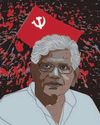
A massive neem tree amid a maize field acts as the only signpost. If not for the tree, one would miss the spot where a massacre took place in early 1858.
We are at Saikdakhedi in Sehore, 40km from Bhopal and about 1km from the busy Bhopal-Indore highway. River Siwan flows close by. The neem tree on Sainik Chawni (cantonment) ground is said to mark the spot where 149 of 356 rebel sepoys of the Bhopal Contingent Force—a joint force raised by erstwhile Bhopal nawabs and the British—were killed by the British on January 14, 1858; the rest were killed in different spots on the ground. As per local lore, the bodies of the sepoys were hung by the tree and later dumped in a common grave.
It is only when one nears the neem tree that the concrete structures become visible. There is a newly built boundary wall that runs along just two sides of the 10-acre plot, a slightly older pavilion-like memorial structure under the tree, and a much older whitewashed tomb. The tomb, which probably marks the grave, is almost buried under a heap of dumped irrigation pipes.
The 10 acres were earmarked for the memorial thanks to Smarak Nirman Samiti, Sipahi Bahadur Sarkar, a citizens’ organisation. Anand Gandhi, 39, general secretary of the Samiti, is saddened by what he sees. The tomb is littered with dried leaves and other refuse. A buffalo is tied nearby. He removes some of the pipes and, picking up a dried branch, sweeps the tomb clean. He, along with the organisation president Omdeep Singh, 80, and social worker Jayant Shah, 57, silently pay homage to the martyrs with folded hands. “You would not imagine this is such an important spot, right?” asked Gandhi.
This story is from the {{IssueName}} edition of {{MagazineName}}.
Start your 7-day Magzter GOLD free trial to access thousands of curated premium stories, and 9,000+ magazines and newspapers.
Already a subscriber ? Sign In
This story is from the {{IssueName}} edition of {{MagazineName}}.
Start your 7-day Magzter GOLD free trial to access thousands of curated premium stories, and 9,000+ magazines and newspapers.
Already a subscriber? Sign In

Themes Of Choice
As Savvy Investors Seek New Avenues, Thematic Mutual Funds Are Gaining Popularity

A golden girl
One of India's most formidable beauties passed away earlier this month. The odd thing is she would absolutely hate this obituary; she hated being written about and avoided publicity for all of her nine decades. Indira Aswani was 93 when she died. But anyone who encountered her, even briefly, was in such awe of her grace and poise, and one could not but remember her forever.

The interest in wine is growing delightfully in India
The renowned British wine writer and television presenter Jancis Robinson, 74, recently came to Delhi and Mumbai to reacquaint herself with India's wine industry. This was the Robinson's fourth visit to India; the last one was seven years ago. On this trip, Robinson and her husband, restaurateur Nicholas Lander, were hosted by the Taj Hotels and Sonal Holland, India's only Master of Wine.

United in the states
Indian-Americans coming together under the Democratic umbrella could get Harris over the line in key battlegrounds

COVER DRIVE
Usage-driven motor insurance policies offer several benefits

GDP as the only measure of progress is illogical
Dasho Karma Ura, one of the world's leading happiness experts, has guided Bhutan's unique gross national happiness (GNH) project. He uses empirical data to show that money cannot buy happiness in all circumstances, rather it is family and health that have the strongest positive effect on happiness. Excerpts from an interview:

India is not a controlling big brother
Prime Minister Tshering Tobgay considers India a benevolent elder sibling as the \"big brotherly attitude\" is happily missing from bilateral ties. He thinks the relationship shared by the two countries has become a model of friendship not just for the region, but for the entire world. \"India's attitude is definitely not of a big brother who is controlling and does not allow the little brother to blossom and grow,\" says Tobgay in an exclusive interview with THE WEEK.

Comrade with no foes
Lal Salaam, Comrade Yechury-you were quite a guy!

Pinning down saffron
In her first political bout, Vinesh Phogat rides on the anti-BJP sentiment across Haryana

MAKE IN MANIPUR
Home-made rockets and weapons from across the border are escalating the conflict